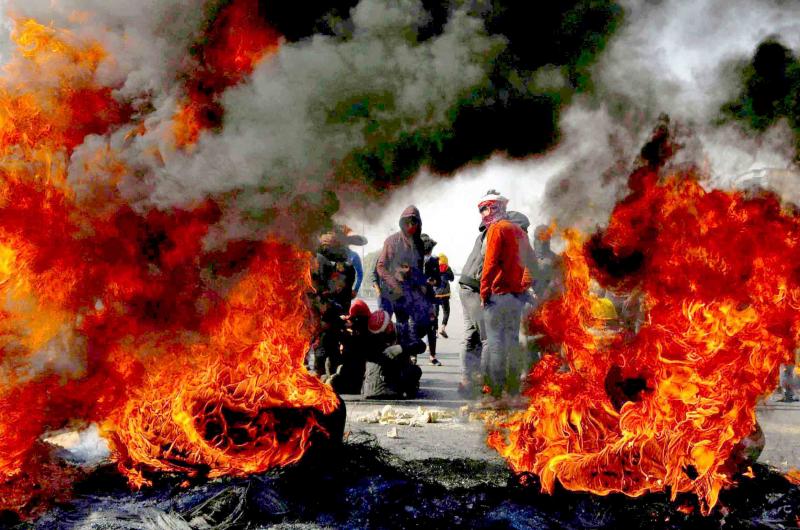The takeover of the building known in Baghdad as the Turkish Restaurant, a discarded edifice that ordinary people reclaimed 100 days ago, turbocharged violent confrontations beyond Baghdad’s epicentre.
The violent surge came one day after Iraqi Prime Minister-designate Mohammed Allawi was sworn into office. Since then civilians donning blue caps and carrying pistols, knives and clubs have flooded protest squares.
They are unofficially known as the Blue Hats, loyalists of cleric Muqtada al-Sadr. Their presence garnered much attention, with the crowd accusing them of sabotaging, assaulting and killing protesters. However, their use of violence has not soured sentiments and protesters continue to peacefully push back.
Flying Molotov cocktails, hand grenades, live ammunition and beatings by ominous actors marked further escalation two weeks after al-Sadr endorsed the central government over the masses’ protests.
Ambulances transported the injured to hospitals. With some hospitals reaching capacity, others were relocated to makeshift medical tents.
A war of words erupted online over the identity of the culprits. Some defended the Blue Hats but others insisted they were to blame for the casualties.
As violence and casualties mounted, Sadrist spokesman Saleh Mohammed al-Iraqi declared that “total control over Sadrayn Square” had been established. He said “all infiltrators have fled the scene.”
Commander of Asa’ib Ahl al-Haq militia Qais al-Khazali called on the state to restrict the use of arms to official actors and re-establish central command of its security apparatus. Allawi urged the government to fulfil its responsibility to protect protesters.
As clashes quietened, Interior Minister Yassin al-Yasiri arrived at the southern city, accompanied by Najaf Mayor Luay al-Yasiri and Chief of Police Faeq al-Fatlawi.
The doctors’ syndicate in Najaf confirmed seven deaths and more than 100 injuries, including gunshot and shrapnel wounds.
“Police forces were present when Sadrists opened fire at crowds but they [the police] did not respond,” one Karbala witness said.
A member of Iraq’s SWAT force was “shot in the leg,” the witness said, adding that, although “protesters allowed passage to SWAT forces, they withdrew from the scene in no time.”
The question was how and from where did saboteurs acquire hand grenades, such as those thrown at unarmed demonstrators.
The spokesman of al-Sadr-commanded Peace Brigade militia, Safaa al-Tamimi, said “the Blue Hats have been present across protest sites for the past four months and, in that time, there had been no confrontation between them and protesters.” He said the latest chapter of violence was written by “those that want a split in the ranks and to sow discord.”
Hazem al-Helfi, a Peace Brigade commander, was reportedly killed after being shot twice in the head.
Witness testimonies suggest that responsibility belongs to al-Sadr loyalists, militia men turned watchmen. Beyond adopted monikers, the propensity for violence as a political function has been consistently used by al-Sadr’s followers, helping them maintain political relevance and reverence of their leader.
“But for how long?” Iraqi activist Amer, from Baghdad, asked.
In defiance of violent strategies by state-affiliated forces, hundreds of students rallied in the streets February 6. Analysts have maintained that al-Sadr’s ability to move the centre renders him powerful but mobilising student masses established their weight as tactical players that cannot be corralled by any political party, faction or bloc.
Before confrontations turned violent, young people in southern cities drove out Blue Hat members from protest areas but the show of force drove many peaceful resistors away.
Similar events in Baghdad inspired civic action by the Students Union, which introduces its “Our pen, our dignity” initiative to respond to the violence by “al-Sadr’s militias,” a member of the union said. “They arrested a few of our members, including a girl,” the young male said.
EU Ambassador to Iraq Martin Huth described events in Najaf as a “sabotage of any political progress.”
The flame of the popular movement that was lit last October has not been dimmed by the spike in violent attacks, which former head of the parliamentary Defence and Security Committee Hakim al-Zamili dismissed live on state-run Al Iraqiya television as “a US-sponsored pantomime.”
“Show me the martyrs. Where are they?” Zamili said.
The movement has proven itself the most immovable object in contemporary Iraqi history, which has pronounced lines of political difference between rival parties that govern the post-2003 order.
Source


 RSS Feed
RSS Feed